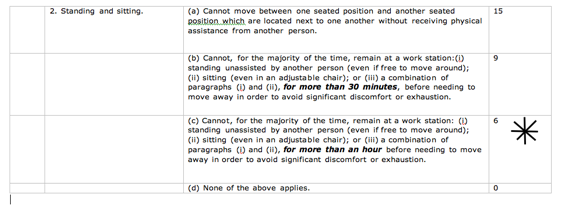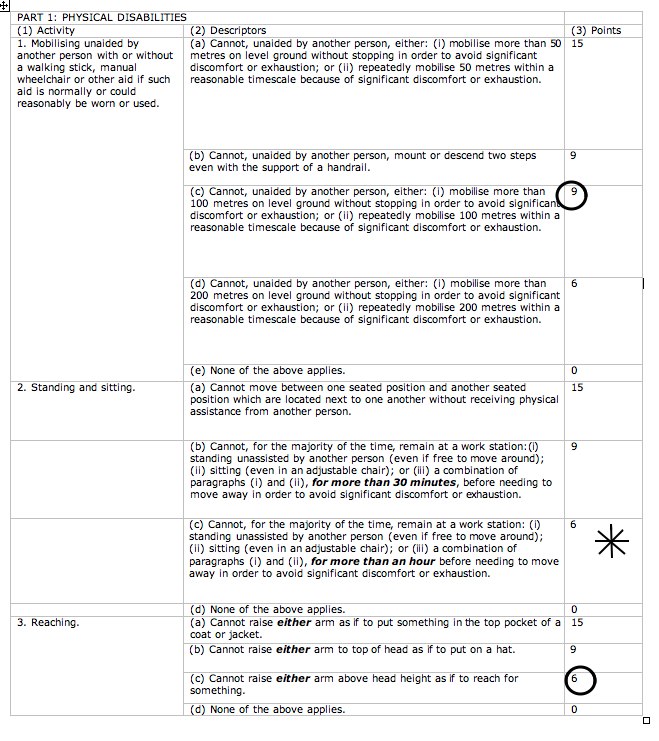But first…
If you’ve just been told that you’re not entitled to Employment and Support Allowance because you ‘don’t have a limited capability for work’ you will probably be angry, worried, and upset. That’s understandable. However when you come to work out your chances of success it’s important to keep a cool head, if you can. If, when you fill in the appeal form or write an appeal letter, you fill it with a long account of how unfair it all is, how bad the medical was, and how you’re going to struggle financially, this isn’t really going to help your case. Remember that even if you’re lucky enough for your appeal to end up on the desk of a sympathetic decision maker, he or she can’t move the goalposts to help you. You need to make sure that they understand clearly exactly why you fit the rules. And if you find out that you don’t fit the rules, the sooner you know this the better.
Before you start, I suggest you print off the score sheet, if you can, or get a copy from somewhere else, like the Jobcentre Plus.
You should also have a long letter from the Jobcentre Plus, telling you which points they’ve awarded you. Have this ready to look it. (If you haven’t got this it’s not the end of the world, but you’ll just have to assume that the Jobcentre Plus gave you no points. First, go through the letter from the Jobcentre Plus to see if they have awarded you any points. If they have, put a star next to each corresponding number on the score sheet. For example, if the Jobcentre Plus has awarded someone (let’s call her Sonya) 6 points for standing and sitting, she would put a star here…

(It’s quite likely that you won’t have to do this, sadly, as it’s not unusual to get no points at all.)
Next, go through the score sheet from top to bottom, and put a circle round the the numbers that you think apply to you.
- Remember that you can only circle one descriptor for each activity
- Be honest and realistic. If something doesn’t apply to you don’t pretend that it does. If you circle numbers to say you can’t do something when actually you can all you are doing is giving you false hope
- If you’re not sure whether a descriptor applies to you or not, talk it through with someone who knows you well and that you trust, if you can
- If you’re not sure how far you can walk, measure it. One way of doing this to find an map of your neighbourhood on the Internet and, using the scale on the map, see how far you can actually walk from your home before you need to rest
- If you are trying to score yourself for mental health activities you are likely to struggle, as many of them are written in a way that are almost impossible to understand, let alone apply to real life. All you can really do here is give it your best shot. So if, for example, you are trying to assess yourself for ‘awareness of hazard’ (activity 12), and you can’t decide whether you need help ‘frequently’ or ‘occasionally’ just take your best guess.
Let’s have another look at our example. To make it tidy for me, let’s say that Sonya has problems with ‘mobilising’, sitting/standing, and reaching only.

Sonya thought that the decision maker was right to give her 6 points for standing and sitting, so didn’t need to circle anything for this.
The next thing you need to do is tot up the scores, including both the points that you have awarded yourself and the ones that the Jobcentre Plus has given you (if any). If the total is 15 points or more then your appeal has some chance of succeeding. If the total is less than 15 points, your appeal is very unlikely to succeed unless we can either of the exceptional circumstances apply to you.
In Sonya’s case, she has awarded herself 15 points (9+6), and the decision maker awarded her 6 points, so the total score is 21 (15+6). It is therefore probably worth appealing.
Before you finish, you need to do one more thing: check whether either of the two exceptional circumstances apply to you. Do this even if you have found 15 or more points, as it’s always worth having an extra argument in reserve.
Ask yourself:
- Do you have a life threatening disease, and is there is medical evidence that it’s not under control, and that, realistically, there’s no way it could be controlled in your case?
- Because of a disability or illness that you have, would there be a ‘substantial risk’ to anyone’s physical or mental health if you had to work or look for work?
Again, it’s important to be honest and realistic about this. And also bear in mind that if the problems can be resolved by taking your medication, or by adjustments in a workplace (a special chair, for example, or regular work breaks) these exceptions won’t apply.

